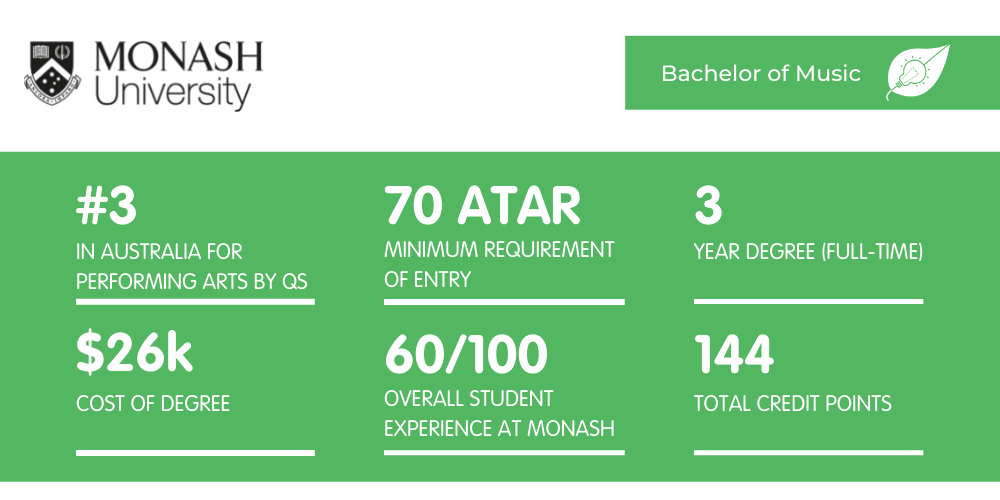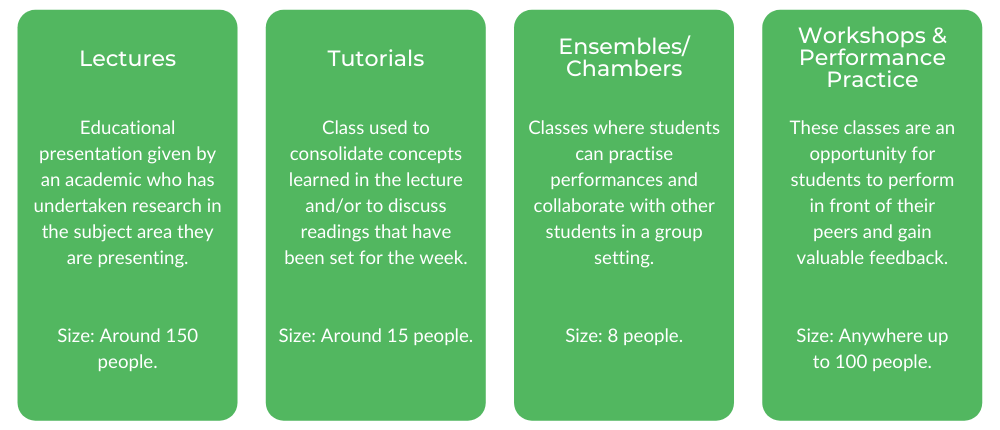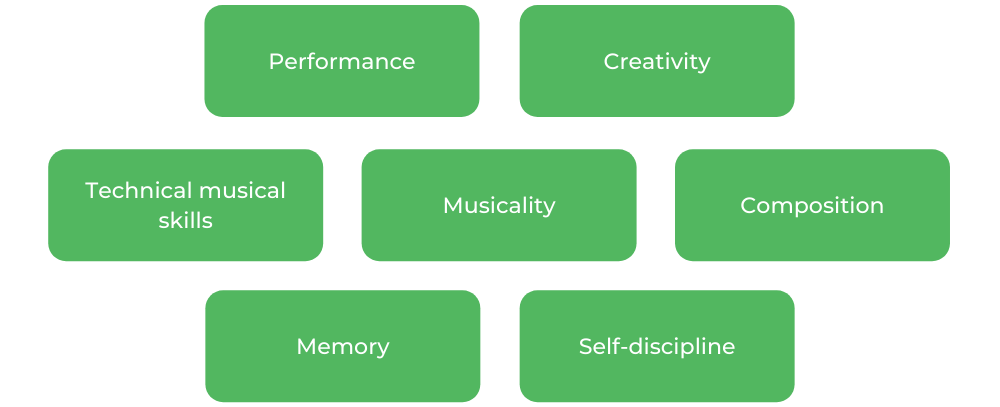Have you ever wondered what it might be like having a career in the music industry? Then a Monash Music degree could be your calling!
Studying a Bachelor of Music at Monash might be your first step in kick-starting a career in the music industry, refining your skills as a musician and helping you grow your professional networks! We’ll be walking you through the different subjects you’ll study, specialisations you can opt into, the culture of the degree, and more.
Let’s get started!
What is a Bachelor of Music at Monash University?
Core Units and Specialisation
How to Get into a Bachelor of Music at Monash
What’s the Teaching Format?
What’s the Faculty and Culture Like?
What is a Bachelor of Music at Monash University?
Studying a Bachelor of Music at Monash will help you to advance your practical skills and enables you to develop your knowledge in Composition, Music Technology, Music Performance and Popular Music. You will be surrounded by music and musicians, having access to a range of educational approaches which include studying with international artists and visitors.
At various points in your degree, you will have a chance to study overseas and take master classes with skilled musicians or perform in famous venues in Prato, Italy or New York. Monash has a Global Immersion Guarantee as part of their Music degree.
Students will get to spend two weeks studying in Italy, Indonesia, India, China or Malaysia with airfares and accommodation covered as a part of their degree. For more information, head here!
Double Degrees
If students choose to do so, they may undertake their Bachelor of Music as a double degree with the following degrees:
- Arts
- Education
- Science
- Commerce
- Law
Honours or Masters
Students who have completed the Bachelor of Music with a distinction average in 24 credit points and an overall WAM of 70 may choose to undertake an additional year of Honours.
Additionally, students who have high academic standing at the end of their second year, or having achieved 96 credit points, will be eligible to progress into Masters units if they choose to do so. For more information, check it out here!
Career Paths
Music graduates are able to work in a range of occupations within corporate sectors, the arts industry or government and private sectors. It is common for musicians to work simultaneously in various roles to optimise their income.
Due to this reality, Monash’s Bachelor of Music is both specialised and diverse to equip students with various skills so that they can make a living through music.
Some careers include:
- Audio engineer
- Festival organiser
- Recording artist
- Freelance performer
- Composer
- Music teacher
Core Units and Specialisations
A Bachelor of Music at Monash enables students to learn practical skills, advanced musicianship and are exposed to creative, cultural, historical and technical aspects of music making and thinking.
The course is developed through three stages:
- Music Specialist Study
- Music Theory and Ear Training
- Music Context Study
There are 36 units for Music Specialist Study that will differ based on the specialisation that you choose. However, they build skills of performance with your primary instrument, a portfolio of compositions, creative music technology media or written work.
Music Theory and Ear Training integrates development of aural skills with theoretical understandings of music through listening, analysis, performance, notation and composition.
Music Context Studies provides students with an understanding of music and music-making in various cultural, historical, social and professional settings in introductory units and experiences. These include units like Music and Culture or the Ethnomusicology of Improvisation.
Lastly, students have 48 credits of Free Elective Study where they are able to choose units within the Music Degree or from other faculties. Students may choose from a combination of Performance electives, Applied electives, Context electives or complete an Overseas Study Program to fulfil the requirements.
What are the Core Units?
All students who study a Bachelor of Music have to complete foundational units to ensure they have a solid technical and theoretical foundation for their specialisation.
“[Core Units usually consist of] theory training and aural training, just learning to know what certain sounds are musically. We also do a lot of writing prep as well for essays, so there is a possibility of going to do postgraduate studies and research work.” — Nicholas Hill, Bachelor of Music (Jazz Performance) III at Monash University
Music Theory and Ear Training is one of four units that integrates development of aural skills with theoretical understanding of music through listening, analysis, performance, notation and composition. In this unit, students are introduced to the practical application and theoretical concepts in Western Art music and Jazz.
Students learn how to identify intervals, chords, metre, rhythm, tonality, scales, melodies, chord function and part writing. These fundamentals are further developed in later units where students learn about idiomatic harmonic procedures or voice leading techniques.
Music and Culture introduces students to music from around the world, exploring how different cultures shape philosophies, techniques, principles and concepts of music. Students analyse performers, audiences, texts and technologies to not only look at how music is made and shared, but also how different musicians learn and what music can reveal about a culture.
In addition to their music units, students will also undertake lessons with a teacher in their specialised instrument throughout the semester.
What are the Specialisations?
Students may choose from three specialisations:
- Composition and Music Technology
- Music Performance (Classical and Jazz)
- Popular Music
Composition and Music Technology focusses on developing theoretical and practical skills in music composition. Students learn how technology in sound, notation, recording and multimedia can be used in their compositions and in creating their compositions.
By exposing students to a range of composition practices and concepts, this specialisation will help you in developing your own compositional styles and an opportunity to work with ensembles and music students at Monash.
In Music Performance, students will have to choose between the Classical or Jazz stream. You will further develop and refine your technique, skills and musicality in your chosen instrument or vocal technique, demonstrating specific performance practice skills by participating in a variety of ensembles. Students will learn how to perform both as a soloist and as part of an ensemble.
Lastly, Popular Music trains musicians, performers and creators, teaching them about practical performance skills and stagecraft. You will learn how to engage with a broad range of creative tools, from songwriting and music production, to creating and distributing contemporary music through a combination of popular music styles.
In their first year, students focus on developing techniques through self-directed practice on their principal instrument. By second year, they will perform in solo and ensemble performances in songwriting, live and recording environments.
In their last year of study, students have the opportunity to create a live performance and recording project under the guidance of expert musicians in their chosen musical style or context.
Are there any internship opportunities?
While there are no specified internship opportunities in-built within the Bachelor of Music at Monash University, there are plenty of opportunities for students to perform or apply their skills in a practical sense.
How to Get into a Bachelor of Music at Monash
To get into a Bachelor of Music at Monash, students need to achieve a 70 ATAR and have taken English as one of their Year 12 subjects.
Requirements
There is an additional requirement of an audition or composition submission for students wishing to study a Bachelor of Music. For additional information and FAQs, Monash has a page here with further details about requirements depending on the specialisation you choose!
While it isn’t listed as a formal prerequisite to the degree, students should be aware that they do need some musical knowledge prior to enrolling into the degree. While Monash will go over the fundamentals and theory aspect of music, many students will have pre-existing knowledge of these and it may not be taught as thoroughly.
It is advised that you would have some foundations in music either through playing an instrument, as a vocalist or a composer.
It should also be noted that students studying Music will need access to their own instruments. While Monash has a limited number of larger instruments available for students to use, like pianos, drum kits or guitar amps, it is expected that students will also have their own personal instruments.
Scholarships
Monash University has a huge range of scholarships on offer for students — these are based upon academic excellence or awarded on an equity basis. Monash also has scholarships specifically for Indigenous and International students, to help students with accommodation or to support them with exchange.
Monash has scholarships and financial assistance available to students who choose to complete part of their studies overseas through exchange. OS-HELP is a Commonwealth Government loan program providing financial assistance to Commonwealth Supported Place students to study their course overseas. Additionally, Monash has an Abroad Travel Grant to support global study or global work integrated learning.
For the full range of scholarships available to Bachelor of Music students, see here!
What’s the Teaching Format?
Students enrolled in a Bachelor Music at Monash have two semesters in a year. Full-time students tend to take four classes in each semester.
Excluding your own time for practising, students can expect to have up to 12 hours of contact due to ensemble rehearsals, workshops, lectures and tutorials.
Class Structure
Generally classes will have lectures and tutorials totalling up to 2-3 hours altogether. If you are taking a more practical unit for your specialisation, this is where Ensembles/Chambers step in with Workshops and Performance practice.
Lectures
Lectures will explain the content and material that you’ll be covering. For music, these tend to include music and score analysis, theory or musical context.
They introduce key ideas to students, providing them with a general idea of the concepts or foundational knowledge.
Tutorials
In tutorials, students have a chance to clarify their understanding of material learned in the lecture and apply them practically. Skills acquired during lectures may be tested through listening exercises or practical exercises.
Ensembles/Chambers
Music students may also find themselves in Ensembles (for Jazz and Pop students) or Chambers (for Classical students), so that they can practise performing and collaborating within a group setting. Generally, these groups will have around 8 musicians who will play their instruments together with practice generally being once a week for an hour and a half.
Workshops and Performance Practice
This leads us to Workshops and Performance practice where the entire cohort comes together to watch each other perform. This provides students with the opportunity to perform in front of an audience and gain valuable feedback from their peers, as well as watch how their fellow musicians perform!
What are the Assessments like?
As musicians, a lot of the assessments are focussed on ensuring that you have solid foundations in your theoretical understanding of music, but also the practical aspects of your chosen discipline.
Nick notes that unlike many other music degrees, Monash also focusses on developing their Music students’ academic writing ability, saying:
“We do a lot of writing prep as well, like essays so there is a possibility of going on to do post-graduation study and research work. As compared to a previous degree I did at another institution, there wasn’t that. So postgrad might have been an option, but it was impossible to actually aspire to unless you were an experienced writer.”
Most assessments are highly practical and performance based, like reflections, aural tests, ear training tests and performance. However, reflections, research presentations and theory tests also ensure that students studying a Bachelor of Music at Monash are able to articulate their knowledge in words as well!
Skills You Refine and Learn
Being a highly practical degree, students will refine their techniques in their chosen discipline and learn how to write academically. Depending on their chosen specialisation, students will learn how to play as a soloist and in ensembles, compose for a range of instruments or various genres, or learn how to use technology to compose or produce music.
Some skills that students will gain include:
- Performance
- Creativity
- Technical musical skills
- Musicality
- Composition
- Memory
- Self-discipline
What’s the Faculty and Culture Like?
Faculty
Monash’s Music staff are some of the finest professionals and scholars in their fields, with staff actively engaged in the music industry, performing nationally and overseas and their own international networks. Students will generally have access to several music professors to talk to or seek advice from — from your private teacher, ensemble director or unit lecturer there’s a bunch of phenomenal musicians guiding you.
Additionally, it is common for musicians from overseas who are in Australia for a performance to stop by and conduct masterclasses with students as well.
“It’s made up of so many different types of really wise musicians and it’s really fun.” — Nicholas Hill
Nick fondly recalls Jordan Murray, who used to be a lecturer at Monash for Jazz and Popular Studies.
“He had some of the best life experiences you’d have access to. He’s a trombone player and he studied at Berkeley in Boston and he was so great he got to play with Aretha Franklin, so it’s just a whole bunch of great experiences from his life.”
Additionally, Johannes Luebbers is the convenor of Composition and Technology at Monash, who is an active composer, arranger and musician. His creative practice explores collaboration within composition and the intersection and significance of genre in contemporary jazz. His research interests encompass jazz, composition and improvisation.
Culture
Music tends to have a small cohort, and this is further narrowed in the specialisation that you choose.
Generally, the amount of rehearsals and time you spend with your peers means that you will get to know people who study the same specialisation as you really well. However, core units and elective units will also ensure that students are able to get to know their peers who are in different specialisations.
While the music community, and by extension, the industry, is a small tight knit community, it can also be competitive. While students work together in ensembles and for performances, or offer feedback on each other’s work, performance or solo opportunities often go to the musician who is the best fit or most skilled.
Societies
The Monash Music Students’ Society is the main society for students who study a Bachelor of Music at Monash.
“[They are a] really positive group of people and they work on improving student life across all streams and offering events like barbecues, bake sales and an annual ball.” — Nicholas Hill
They also help students to get gigs on and off campus! With both paid and volunteer opportunities available, students are able to perform across a range of contexts and gain practical experience outside of an academic context.
Support
The Monash Music Students’ Society provides a range of support for students, from advising first years, hosting social events and helping you and your band to find gigs! They are the perfect first point of contact for students who are seeking help.
Additionally, the wide range of staff that students will work with over their 3-year degree are also a great support system for students. Whether in regards to their study, developing their musicianship or building a career in the music industry, the small classes and private lessons or ensembles will ensure that students are able to build solid relationships with their teachers during their degree.
Tiffany Fong is currently completing a double degree in Media and Communications with Law at Macquarie University. She currently contributes to the university zine, Grapeshot where she enjoys writing feature articles, commentary on current affairs or whatever weird interest that has taken over her mind during that month. During her spare time, Tiffany enjoys reading, writing, taking care of her plants or cuddling with her two dogs.






